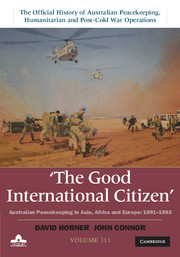Book contents
- Frontmatter
- Contents
- Maps
- Preface
- Chronology 1989–99
- Abbreviations
- Part 1 Strategy and policy
- Part 2 Cambodia
- Part 3 Western Sahara
- Part 4 Former Yugoslavia
- Part 5 Watch on Iraq
- 16 A new type of commitment
- 17 Disarming Iraq
- 18 A limited liability
- 19 Unscom and the US alliance
- Conclusion
- Appendix A United Nations Security Council resolutions
- Appendix B Major office bearers, 1991–99
- Bibliography
- Index
- Plate section
- References
19 - Unscom and the US alliance
Australia recommits forces to the Gulf, 1997–99
from Part 5 - Watch on Iraq
Published online by Cambridge University Press: 12 May 2022
- Frontmatter
- Contents
- Maps
- Preface
- Chronology 1989–99
- Abbreviations
- Part 1 Strategy and policy
- Part 2 Cambodia
- Part 3 Western Sahara
- Part 4 Former Yugoslavia
- Part 5 Watch on Iraq
- 16 A new type of commitment
- 17 Disarming Iraq
- 18 A limited liability
- 19 Unscom and the US alliance
- Conclusion
- Appendix A United Nations Security Council resolutions
- Appendix B Major office bearers, 1991–99
- Bibliography
- Index
- Plate section
- References
Summary
With Iraq refusing to rescind its ban on US inspectors, by the beginning of November 1997 the dispute between Iraq and the United Nations was at its most intractable since Unscom's inspections began in May 1991. Australian newspapers noted that the dispute was ‘ready to go from confrontation to crisis’ and, as the likelihood of US military action increased, the Australian Government began to consider its position. On 3 November DFAT officials advised the Foreign Minister, Alexander Downer, and the Trade Minister (and deputy Prime Minister), Tim Fischer, that Saddam's defiance of Unscom was ‘intolerable, and that he must agree to permit entry by US inspectors. There is now one important question (as yet only hypothetical): would we endorse American use of force?’ The officials concluded that Australia's ‘wider interests’ required it to ‘endorse American use of force’, but there was a risk of damaging commercial interests in Iraq, particularly to Australian wheat exports, which were running at 100 000 tonnes per month.
The question was answered on 5 November when the Prime Minister, John Howard, told his advisers that Australia would support any US use of force provided that two conditions were met: that the military response be proportionate and aimed at economic or military targets; and that the Iraqis be given some warning, with a chance to back down. There was, however, an even more important question that had not yet been asked: would Australia commit forces to military operations?
- Type
- Chapter
- Information
- The Good International CitizenAustralian Peacekeeping in Asia, Africa and Europe 1991–1993, pp. 501 - 533Publisher: Cambridge University PressPrint publication year: 2014

